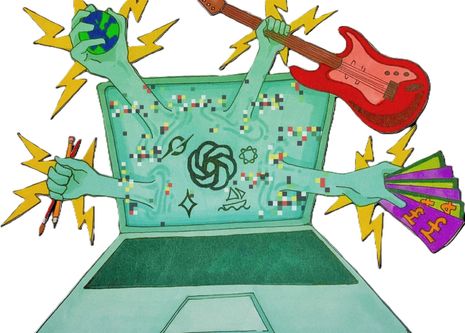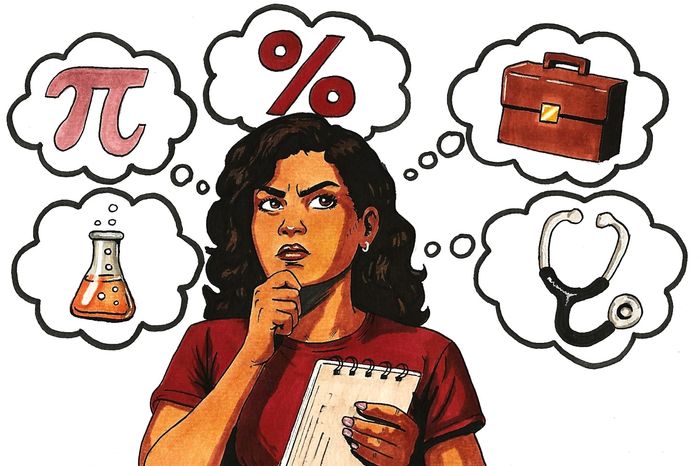Is AI really killing the graduate job market?
Calum Murray speaks to employers and experts about the realities of a graduate labour market that has come under pressure from AI

With increasing numbers of undergraduate students bringing increasing levels of competition, Cambridge students are complaining of a rough time trying to land a graduate job. The rapid development of generative AI technology – and its ability to perform routine digital tasks traditionally completed by entry-level staff – has led to widespread fears that things could get much worse.
Job site Indeed’s analysis paints a worrying picture. It claims that “Graduate jobs are scarce, with the share of grad jobs the lowest since at least 2018.” 12% fewer graduate jobs were posted on Indeed compared to last year, with another site, Adzuna, reporting a 32% decrease from three years ago.
Some have been quick to blame AI for the apparent collapse in graduate job openings. Student Connor Myers recently wrote in The Guardian, “As if graduating weren’t daunting enough, now students like me face a jobs market devastated by AI.” Industry insiders have also been warning of AI’s potential to replace entry-level workers, with AI developer Anthropic boss Dario Amodei claiming that artificial intelligence could cause major job losses.
“Industry insiders have also been warning of AI’s potential to replace entry-level workers”
For Graham Philpott, the University’s Head of Careers, however, misrepresentations of available jobs data have led to major exaggerations of the gravity of the situation. “Adzuna and Indeed, they’re mainly professional jobs boards, they’re mainly job boards that are looking for experienced hires. So things that are coded as ‘early career’ are usually rubbish.”
He pointed instead to graduate job boards like the Institute of Student Employers (ISE) and Target Connect as a better indicator of the situation. Their data paints a much more promising picture, with the ISE reporting that, amongst the 69 larger employers it surveyed, “overall graduate job vacancies are down 7%”. Group GTI, who run the platform Target Connect, reported job postings as being up 8% during the 2024/5 hiring season compared to 2023/4.
While Philpott conceded that there was a small overall drop compared with the years immediately following the pandemic, he was sceptical that AI was to blame. “I’d be surprised if much of the drop is that [AI]. The economy isn’t going well, the economy is more likely to have accounted for most of the drop.”
“I’d be surprised if much of the drop is that [AI]”
Jorge Velez Ospina, the Principal Economist at the National Centre for Universities and Business, agreed, blaming “high interest rates, global uncertainty and weaker demand” for a “general slowdown across the labour market”. He also pointed out that the post-pandemic years, which current figures are often compared to, were exceptionally strong as a result of the effects of economic reopening, saying “current conditions reflect normalisation from an unsustainable peak that should never have been considered baseline.”
There does, however, remain cause for concern for Cambridge students anxious about their graduate role being replaced by a machine. Both the OECD and IMF have found that artificial intelligence could disrupt white-collar professions, with more routine tasks, often performed by graduate hires, most at risk.
Philpott argued this could disrupt traditional routes for graduates seeking to enter the professional world. Organisations like the ‘Big Four’ accounting firms (KPMG, EY, PwC, and Deloitte), among which reductions in graduate hiring have been reported, have traditionally had large graduate intakes, on the basis that they could “do some relatively mundane tasks for a couple of years, whilst they develop their professional skills”. Philpott said that there was a “very live question […] [of] if we’re not going to get them to do these mundane tasks anymore, then how are we going to get them to develop those skills later?”
“There is a need for broader human-centric skills”
In a recent article for The Times, PWC chief Marco Amitrano admitted to “hiring fewer graduates this year,” and said AI-exposed occupations were growing at a slower pace than others. Reports have found reductions in hiring across the Big Four, with KPMG cutting its graduate recruitment scheme by 29% and Deloitte by 18%, according to The Telegraph.
A spokesperson for KPMG told Varsity: “We continue to invest in our future pipeline of talent and are looking forward to welcoming our next intake of graduates and apprentices this month.”
Velez Ospina said that AI was leading some organisations to reduce hiring, which he referred to as “Retain and pause […] retaining most the current staff and delaying entry-level hires until they see the real impact of AI.” However, he was also optimistic that human capital could find value in an AI-based workplace. “Rather than replacing jobs, we will see a replacement of tasks […] and that means that creativity, human based skills, networking and those kind of elements that graduates get from their studies are not going to be replaced.”

Does studying STEM still guarantee success after graduation?
The KPMG spokesperson agreed, arguing that despite the use of AI, “there is a need for broader human-centric skills such as agility, ethical decision-making, and creative problem-solving.” They suggested the organisation was looking to teach its graduates and apprentices to make use of new AI tools, with Chartered Accountants Worldwide research showing that 83% of 18-24-year-old chartered accountants are already using AI weekly.
Velez Ospina was sceptical of those who saw the value of a university education as being eroded by a more competitive graduate jobs market. Concern over a diminishing ‘graduate premium’ is widespread, yet he argued that more competition “doesn’t mean the graduates don’t have the skills and the capabilities to deliver outcomes in the market.” “The latest data from Universities UK shows that almost 61% [of the workforce] will have to have a graduate education level [by 2035].”
Philpott pointed to a reassuring picture painted by Graduate Outcomes Survey data: “Looking at the Cambridge students who graduated in 22/23, there are little changes in terms of what they’re doing, but there’s no trend coming through that they’re going into entirely different career paths or entirely different sectors.” His main advice – to understand and be comfortable with generative AI, the future tools of the workplace. “A lot of people already are using it [AI] as part of their studies […] to help them do better work; and being able to show that you can translate that into doing better work in employment is a really important thing.”
 News / Judge Business School advisor resigns over Epstein and Andrew links18 February 2026
News / Judge Business School advisor resigns over Epstein and Andrew links18 February 2026 News / Hundreds of Cambridge academics demand vote on fate of vet course20 February 2026
News / Hundreds of Cambridge academics demand vote on fate of vet course20 February 2026 News / Petition demands University reverse decision on vegan menu20 February 2026
News / Petition demands University reverse decision on vegan menu20 February 2026 News / CUCA members attend Reform rally in London20 February 2026
News / CUCA members attend Reform rally in London20 February 2026 News / Gov grants £36m to Cambridge supercomputer17 February 2026
News / Gov grants £36m to Cambridge supercomputer17 February 2026









